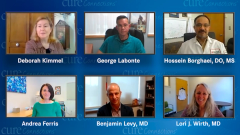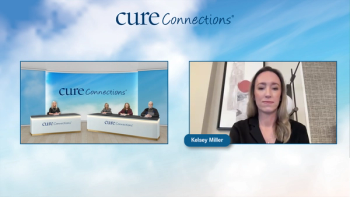
Educating Patients About Biomarker Testing
Common questions asked by patients with lung or thyroid cancer who have been referred for biomarker testing and advice for setting expectations from test results.
Episodes in this series

Hossein Borghaei, DO, MS: I want to bring Ms. Ferris into the discussion. We’ve heard a lot about molecular testing, Ms. Ferris, and in your position at one of the major patient advocacy groups, I’m sure you’ve heard a lot from patients who’ve undergone biomarker testing. I was wondering if you can share what you’ve heard from patients. It would be interesting to hear your perspective regarding patients who have had testing and patients who haven’t had testing.
Andrea Ferris: First, thank you for having me. It’s a very important topic and something that LUNGevity has been engaged with for a lot of years, going back to 2014, when we started to ensure that all people diagnosed with lung cancer have access to comprehensive biomarker testing. You asked what patients talk about with respect to it. To be honest, I wish that everybody could go see Ben [at Johns Hopkins Sidney Kimmel Cancer Center]. That would be amazing. But the majority of our patients don’t go to academic centers. They’re being treated in a community setting, and frequently they don’t even know if they’ve had the testing done. Their doctors don’t talk to them about that. They just put them on a treatment. I hope they’re making the treatment decision based on the outcome of this test. We know that’s frequently not the case, and it’s something we’re working on—increasing the usage of the test. So there are a lot of layers to this question.
People who’ve had the biomarker testing done approach their treatment and their whole disease very differently because they’re much more informed. But they’re also people who choose to and want to be informed. Not everybody wants that. A lot of people just want the doctor to make the decision for them. But those who’ve had comprehensive biomarker testing done, who’ve had the benefit of going to a doctor or a provider who explains to them what this means and they understand it, are in a much calmer place about their treatment and about their disease. They feel more in control of it than others who haven’t had that same experience.
Hossein Borghaei, DO, MS: Excellent. What are some of the common questions from patients, Dr. Wirth, when you recommend testing? What do they want to know? Do they ask you about the specifics? How do you approach that?
Lori J. Wirth, MD: I think it’s on us to help answer the unasked questions. Doctors do a great job with information overload and hammering our patients with so much information that their heads are spinning. When we start to talk about molecular diagnostics, we can get there pretty quickly. We have to constantly remind ourselves to step back and stop talking medicalese, and talk about the testing and the rationale for the testing—how it’s done, what the results might mean, what we might do with the results—in the patient’s language. Also, we need to circle back and talk about these complicated issues again at a second visit. We need to give patients an opportunity to digest the information from information, so they can have a chance to come back and ask the questions that have been circling in their minds. I always encourage people to go home and think about things. I give them written information, then I tell them to take notes on it and bring back their questions the next time. We should ask our patients what the most common questions are.
Hossein Borghaei, DO, MS: We’re definitely going to get there, and I’ll also ask some of the questions directly from our patients also.
Andrea Ferris: May I just add to that, please? I can’t speak to the patient with thyroid cancer, but Dr. Wirth, I very much appreciate what you were saying in terms of explaining things to patients. Also, it’s incredibly important to not just talk about what the testing or process is, and how you’re going to use the information afterward, but to set expectations about what information you can and cannot gather from it and what information you’re not going to learn from it as well. Especially in the lung space— Ben, you can probably talk about this part as well—there’s a significant time delay. For the general public, two weeks doesn’t sound like a long time. But if you’ve just been thrown a curveball and been given this diagnosis of stage IV lung cancer, two weeks is a really long time.
So it’s hugely important for the doctor, the health care team, to talk to the patient about why it’s important to wait for the test results and to help calm their nerves, to tell them, “You know what, for most people, the disease isn’t going to just explode over the next two weeks. It’s better to make the right treatment decision for you than to rush to put you on something that might have bad outcomes, because then we might not be able to put you on the right therapy because of what’s been done in between.” That whole level setting about the time and why it’s hugely important to wait is probably as important as ordering the test itself.
Benjamin Levy, MD: Yeah, great point. Two weeks is an eternity between the ears of most patients. What I tell patients is, “Let’s leave this question mark for the next two weeks so we can answer it with the right explanation.” We want to take the time to make the right decision and give the patient the right therapy, and we can’t do that until we have this test back. Fortunately, with blood, something that I didn’t have time to mention is that we can get a rapid turnaround—as you know, Hoss—within five to seven days. Oftentimes we’re circumventing even waiting for tissue or getting that result back, but still that’s a long time. Part of that first visit for me is level setting and giving them an understanding of where we are in the process. Are we on the diagnostic side or the therapeutic side? We’re usually obviously still in the waiting phase of collecting all the information. But I tell the patient the decision is too important to not get it right. We really need to wait for all the information. That’s important.
Andrea Ferris: The other thing that you can probably comment on, Ben: In lung cancer there’s been an explosion of therapies, and the pace that we’re learning new things is accelerating incredibly fast. Waiting for the test results is important not just for what’s the first treatment but also for what’s next. That’s what we hear a lot as well, that the doctor said, “Let’s just focus on now,” but never talked about what’s afterward. With some of these tests, we’re able to lay out more of a treatment path and journey rather than just the one-offs, and that’s also important for people to understand.
This transcript has been edited for clarity.




